Even though the McLaren 750S is essentially an updated version of the 720S, it’s perfection on four wheels
March 3, 2024 at 12:38
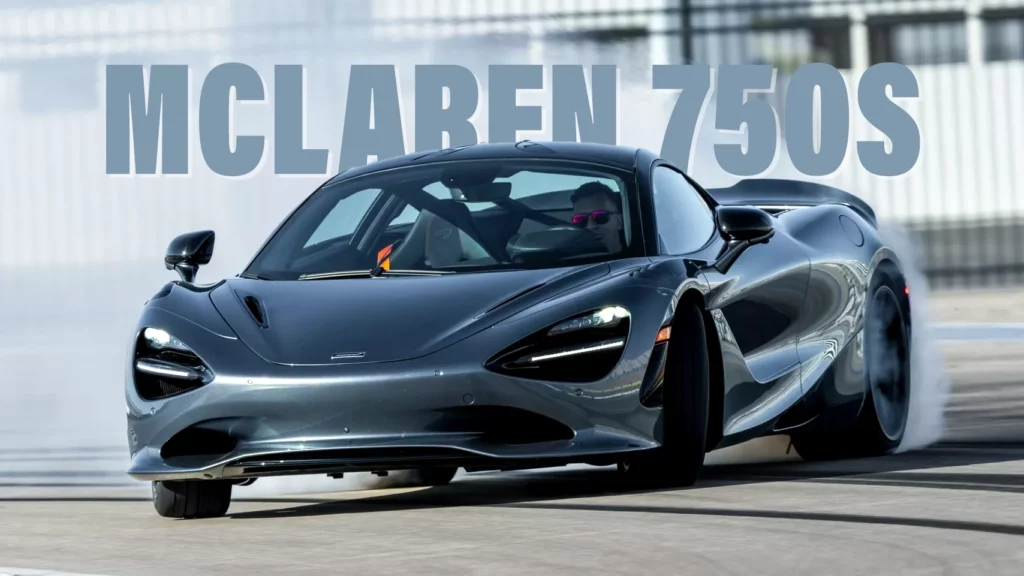
Wouldn’t it be nice to hit the reset button, go back in time, and get a second chance? The possibilities are endless and you’d likely achieve a better outcome the second time around.
That’s certainly the case with the McLaren 750S, which replaces the 720S but feels more like an evolution of it. This isn’t surprising, as roughly 70% of the car carries over, but the bits that have changed make a big difference.
The end result is not only the lightest and most powerful series-production McLaren ever built, but also one of the most engaging and emotional. All of this adds up to motoring perfection as the 750S is a remarkable driver’s car, a comfortable cruiser, and a joy on the track.
FAST FACTS
Pardon Me, You Look Familiar
advertisement scroll to continue
Michael Gauthier / CarScoops
While a lot has changed, the design is instantly recognizable and this makes it hard to tell the 750S apart from its predecessor. However, a closer inspection will reveal numerous updates including a new front bumper and an extended splitter. They’re accompanied by narrower ‘eye socket’ intakes, while the headlight surrounds are now available in gloss black, body color, or carbon fiber.
Moving further back, designers reimagined the rear deck and added vents for improved cooling. The carbon fiber wing is also new and features a 20% larger surface area for additional downforce. They’re joined by new wheel arch vents and a modified bumper that has outlets to reduce air pressure and enhance cooling. Buyers will also find sportier intakes as well as flowing bodywork that is constructed out of aluminum and carbon fiber.
One of the most noticeable changes is the new center-mounted stainless steel exhaust system. It’s 4.8 lbs (2.2 kg) lighter than the dual exhaust used on the 720S and it has been “acoustically tuned to give a sharp crescendo” as well as a “natural and clear tone.”
The weight savings extend far beyond the exhaust as the 750S rides on a set of ultra-lightweight forged wheels that are 30.4 lbs (13.8 kg) lighter than the ones found on the 720S. That’s a huge reduction and it’s not surprising to learn they’re the lightest wheels ever fitted to a series-production McLaren as standard equipment. Even the windscreen has gone on a diet as it’s 3.5 lbs (1.6 kg) lighter than before.
Drop Top Dynamo
We spent a majority of our test drive with the 750S Spider and it’s notable for featuring a unique upper Monocage II-S architecture. The carbon fiber structure resides above the engine compartment and has been designed to accommodate the rollover protection system as well as the retractable hard top.
The latter is made out of carbon fiber and gracefully retracts in a symphony that is driven by eight electric motors. The roof opens in less than 11 seconds at speeds up to 31 mph (50 km/h), and will put a smile on your face almost as fast.
Also: New McLaren 750S Sold Out Until Spring 2025
With the roof down and windows up, wind buffeting is kept to a minimum and the experience is pleasantly hushed aside from the sound of the twin-turbo V8. If you’d rather not mess up your hair, the Spider’s rear window can be lowered independently of the roof to let in some of the sound and fun.
The hard top can be outfitted with an electrochromic glass panel that transforms from clear to opaque at the touch of a button. The transition is nearly instantaneous and helps to make the cabin feel airy and bright.
advertisement scroll to continue
The electrochromic glass isn’t the only party trick as there are discreet controls on the bottom of the driver’s door. They provide access to a small storage compartment when the roof is up. More interestingly, the car’s flying buttresses are transparent and vastly improve rearward visibility. The buttresses are also functional as they “create a high-pressure zone over the rear tonneau cover to reduce rear axle lift.”
A Comfortable And Spacious Cabin
Michael Gauthier / CarScoops
Once you open the dihedral doors, you’ll be greeted by a spacious and familiar cabin. Changes are limited, but the model follows in the footsteps of the Artura by adopting a new digital instrument cluster that is flanked by controls for the Active Dynamic system. The latter enable you to quickly switch between Comfort, Sport and Track modes for the powertrain and suspension.
The display is crisp and clear, but no longer folds. While it’s sad to see that particular gimmick go away, the new cluster weighs 4 lbs (1.8 kg) less than its predecessor.
Sticking with screens, the car has a new infotainment system with an 8-inch display. It’s fast and responsive, but a little basic. However, it features improved graphics, intuitive menus, and Apple CarPlay.
The screen is surrounded by streamlined switchgear as the previous shortcut buttons have been eliminated. That isn’t the only change as drivers will find a new Speedy Kiwi for the McLaren Control Launcher. It’s effectively a ‘favorite’ mode as owners can store their preferred aerodynamic, handling, powertrain, and transmission settings and then pull them up with a push of the button.
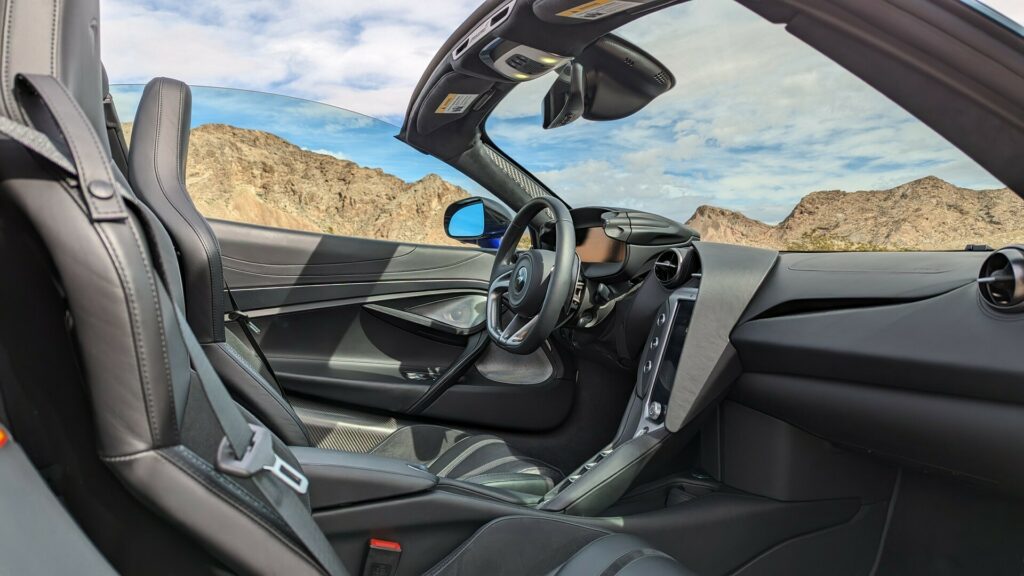
The 750S has new carbon fiber-shelled racing seats that weigh a combined 38.6 lbs (17.5 kg) less than the ones used in the 720S. Customers can also get Comfort Seats, which offer heating, power adjustment, and memory for $3,900. They’re pleasantly plush and were perfectly comfortable on our trek outside Las Vegas.
If you want to be a track day superstar, the $7,600 Super-Lightweight Carbon Fiber Racing Seats are calling your name. They use a new double-skin shell technology, which enables them to be 33% lighter than the same seat shell built using conventional manufacturing techniques.
So how light are they? McLaren says each shell weighs 7.4 lbs (3.4 kg), which is pretty remarkable for a road-going model. They’re eye-catching and look extremely supportive.
An Alcantara interior comes standard, but customers can also order Performance and TechLux themes. The former combines Alcantara with Nappa leather, while the latter has Nappa leather throughout.
Speaking of options, customers can easily personalize their 750S as the company offers an $8,750 Carbon Fiber Interior Pack, colorful seat belts, and an Alcantara steering wheel. Coupe buyers can also opt for a $6,150 titanium harness bar or a $6,050 double glazed engine window, which lets you see the twin-turbo V8 through a small cutout in the rear luggage shelf.
A 740 HP Tribute To The ICE Age
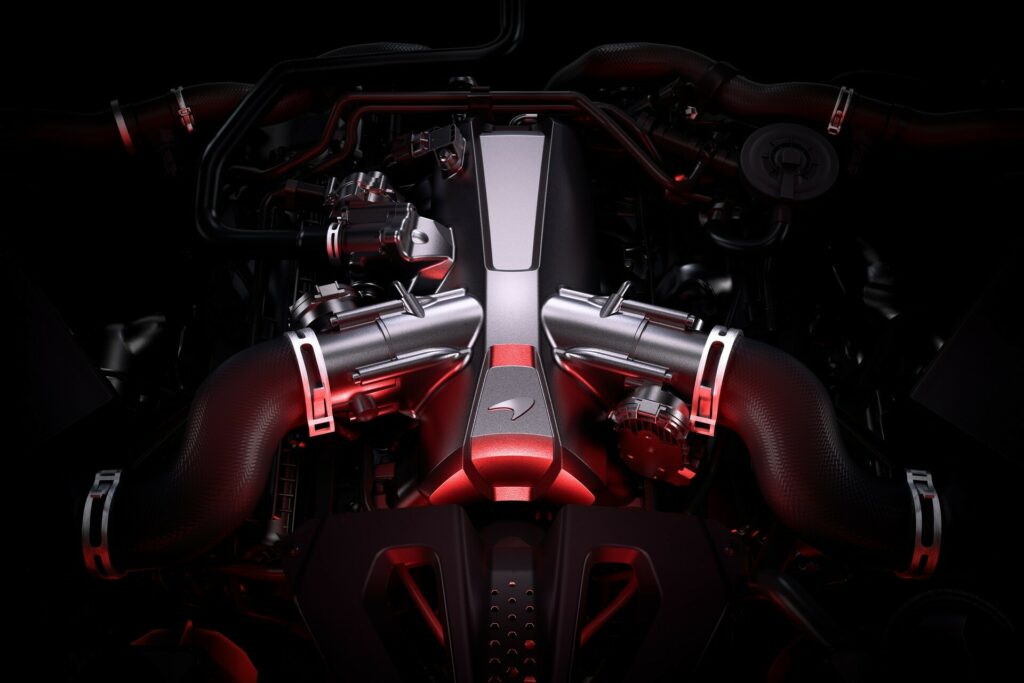
The engine is the heart and soul of a supercar, and the 750S has a twin-turbo 4.0-liter V8 that benefits from a host of improvements including lightweight pistons borrowed from the 765LT. The engine has also been equipped with new turbochargers that deliver increased boost pressure.
Read: The 750S Could Be McLaren’s Final Non-Hybrid V8
Speaking of which, the car uses a new triple layer head gasket to handle increased cylinder pressures. On top of that, engineers installed an additional high-flow fuel pump for an increased flow rate at higher RPMs.
Thanks to these and other changes, the output climbs from 710 hp (537 kW / 720 PS) and 568 lb-ft (770 Nm) of torque to 740 hp (552 kW / 750 PS) and 590 lb-ft (800 Nm). That’s an increase of 30 hp (22 kW / 30 PS) and 22 lb-ft (30 Nm).
This means the car is nearly as powerful as the 765LT, which has 755 hp (563 kW / 765 PS) and the same amount of torque. As a result, it’s not surprising to learn the 750S can rocket from 0-60 mph (0-96 km/h) in 2.7 seconds, before hitting a top speed of 206 mph (332 km/h).
While few owners will likely care, the 750S has a fuel economy rating of 15 mpg city, 19 mpg highway, and 17 mpg combined. Those are SUV-like numbers and the model gets slapped with a $1,300 gas guzzler tax.
Besides the almighty engine, the 750S has a 15% shorter final drive ratio and this results in a 10% improvement in in-gear acceleration. The seven-speed gearbox also has a new ‘limit downshift’ function, which delays downshifts that would over-rev the engine until the “engine speed and road speed can be harmonized.” The feature is designed for track use and should aid newbies.
Michael Gauthier / CarScoops
Speaking of performance, it’s impossible to overlook the weight savings. The model is 66 lbs (29.9 kg) lighter than the 720S and weighs a mere 2,815 lbs (1,277 kg) dry in its lightest configuration. The latter figure is 425 lbs (193 kg) less than its “closest competitor.”
While McLaren didn’t name names, they’re talking about the Ferrari 296 GTB which weighs 3,241 lbs (1,470 kg) dry. That particular model has a plug-in hybrid powertrain that consists of a twin-turbo 3.0-liter V6, an electric motor, and a 7.45 kWh battery pack. Despite having a combined output of 819 hp (610 kW / 830 PS), the prancing horse is slightly slower in the dash from 0-62 mph (0-100 km/h) and the sprint from 0-124 mph (0-200 km/h).
As for the Spider, it also drops 66 lbs (29.9 kg) and has a dry weight as low as 2,923 lbs (1,326 kg). That’s only 108 lbs (49 kg) more than the coupe and it shows the benefits of carbon fiber.
A Next Level Driving Experience
Michael Gauthier / CarScoops
A lot of companies like to talk about the connection between man and machine, but McLaren seems to have perfected it. The 750S feels like a natural extension of yourself as engineers created a driving experience that is virtually unrivaled.
The driver first mentality is apparent as soon as you slip behind the minimalist steering wheel as the 750S offers better visibility than some crossovers. Besides the transparent buttresses, there’s an expansive windscreen, sizable door mirrors, and upgraded rear view and surround view camera systems.
After setting off, you’ll immediately notice the steering is nothing short of perfection. It’s perfectly weighted and will tell you exactly what the wheels are doing regardless if you’re hitting apexes or taking a leisurely midnight drive.
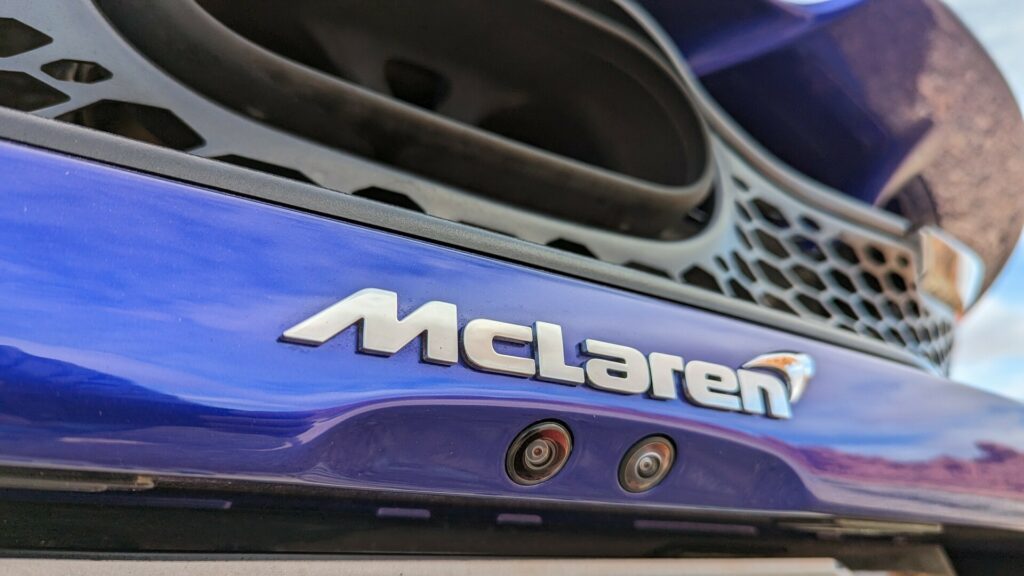
The experience is next level and it’s aided by a handful of improvements that help the car to feel even more direct and precise. In particular, the 750S has a faster steering ratio and a new power-assistance pump for greater refinement.
The other big takeaway is that the 750S is surprisingly comfortable and a true everyday supercar. On the smooth roads in and around Las Vegas, the Spider exhibited a sublime ride quality that was firm, but compliant. Minor imperfections made themselves known, but they didn’t come across as overly harsh.
As the road quality deteriorates, so does the ride. This is hardly surprising, but the washboard-like surface of a construction zone had me begging for smooth pavement. Thankfully, stretches like that were few and far between.
McLaren
Despite being comfortable on the street, the 750S was more than capable at the Las Vegas Motor Speedway. During hot laps, the coupe exhibited tons of grip and the experience can be fine-tuned using the aforementioned drive modes. That being said, the car stays impressively planted even when pushed into corners harder than you should have done. Even when hell’s about to break lose, the 750S will let you know and give you a chance to recover.
Those with greater skill have a lot to look forward to as the car is a surgeon in corners, carefully slicing its way through without breaking a sweat. After that, a quick push on the accelerator launches you down the straight.
You can thank McLaren’s Proactive Chassis Control III suspension for the well-sorted ride and handling. The latest version of the suspension is debuting on the 750S and it features 3% softer front springs as well as 4% stiffer rear springs than the 720S.
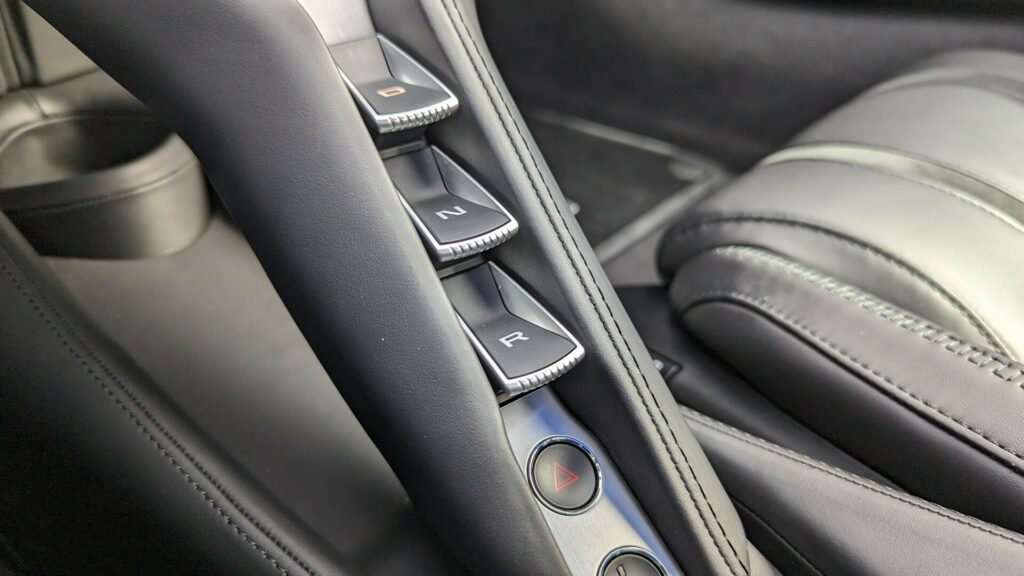
Those aren’t the only changes as the springs are 4.4 lbs (2 kg) lighter and the car has been equipped with bespoke twin-valve dampers, with passive and active elements, and new in-strut accumulator adjustment. On top of that, there’s a new suspension geometry as well as a 0.2 inch (6 mm) wider front track. Rounding out the highlights are new software and a revised tire lineup that now includes the Pirelli P Zero Trofeo R. That’s a lot to take in, but McLaren says the changes benefit “ride comfort, roll control, steering feedback, and cornering balance.”
Besides impeccable handling, the 750S is outfitted with a fantastic carbon ceramic braking system that has a new brake booster for improved pedal feel and modulation. Those two characteristics are on point as the brakes feel extremely natural. It’s also easy to predict how they’ll react both on the street and the track.
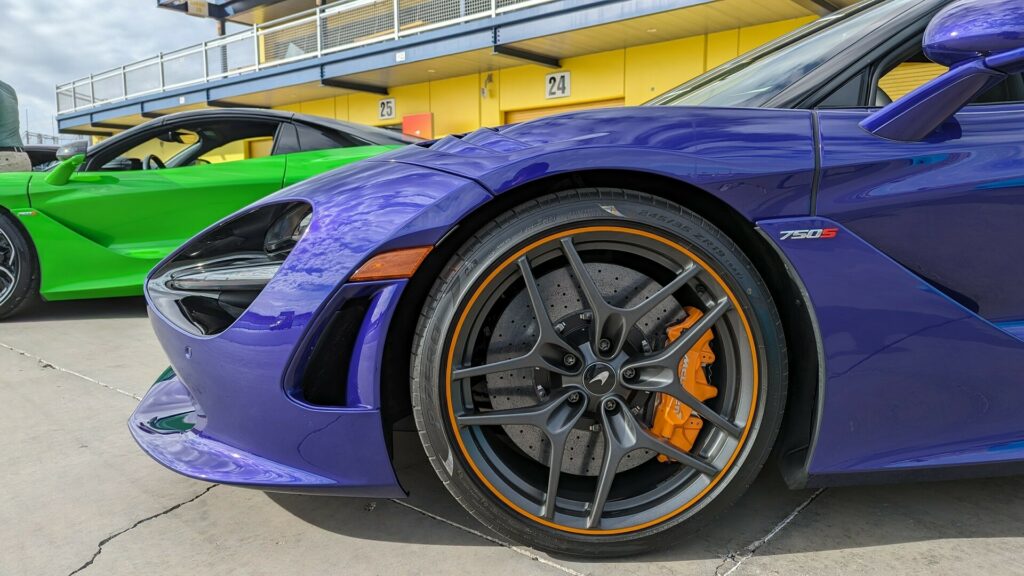
The discs measure 15.4 inches (391 mm) front and 15 inches (381 mm) back, and they bleed speed with impressive ease. It’s also worth noting the active rear wing helps to increase rear downforce when braking and can even help shorten braking distances by tilting forward during hard stops.
If the track is your home away from home, you’ll want to opt for the new track brake upgrade. It features ceramic discs and monobloc calipers derived from the braking system found on the McLaren Senna. The package also includes a “new brake booster and vacuum pump and Formula 1-inspired integrated caliper cooling technology.”
Last but not least, the 750S is a bit more livable as it has been outfitted with an improved vehicle-lift system. It raises the front end in four seconds, more than twice as fast as in the 720S.
The Last Of Its Kind
How do you sum up a car like the McLaren 750S? By saying driving is believing.
There’s nothing else quite like it and there probably won’t be as the world is embracing electrification. Despite that, the 750S doesn’t feel like a dinosaur waiting for the asteroid to hit. Instead, the car feels like it’s in the prime of its life and enjoying every moment.
We can take solace in that, even if we can’t afford the $324,000 starting price for the coupe or the $345,000 sticker for the convertible.
